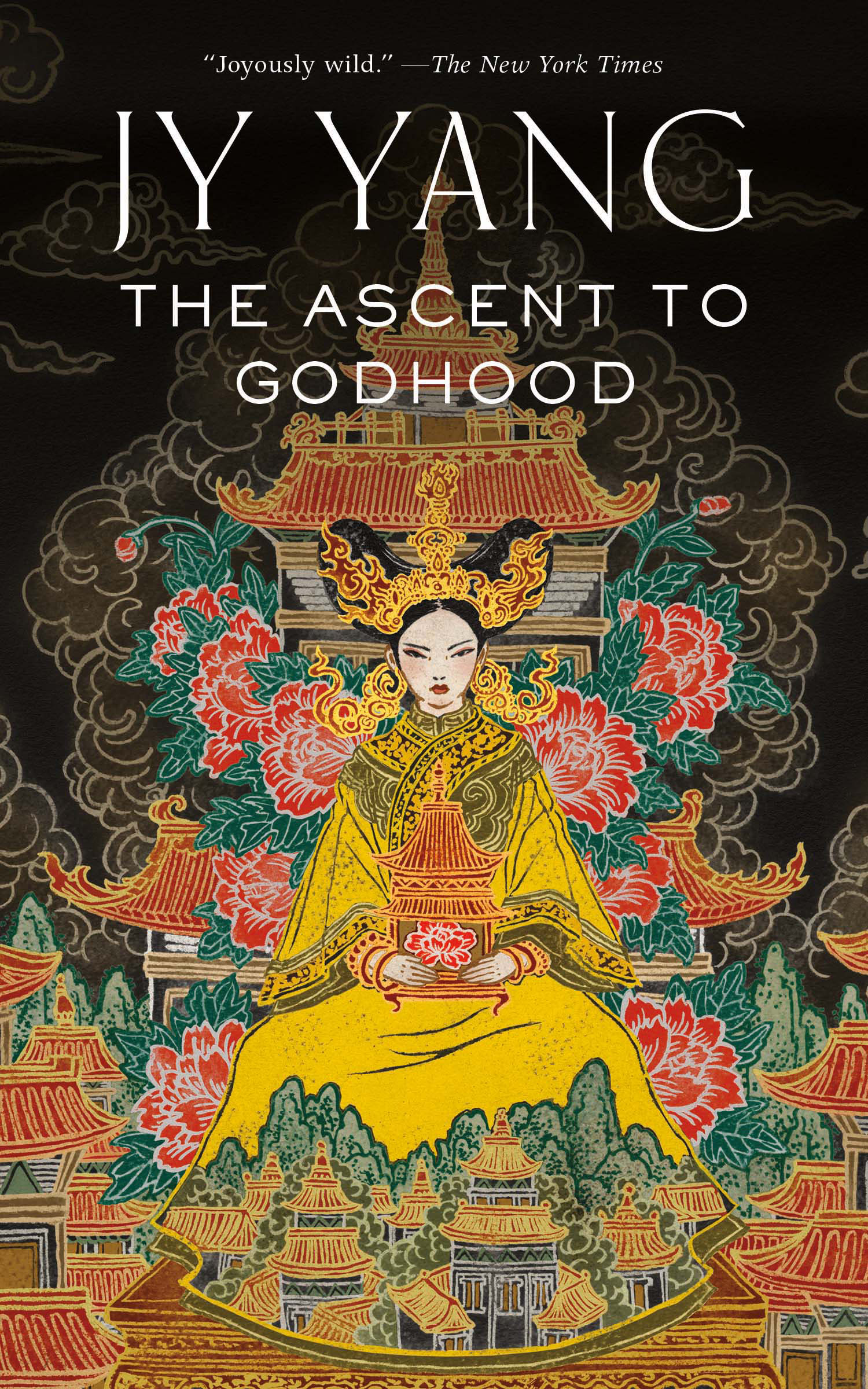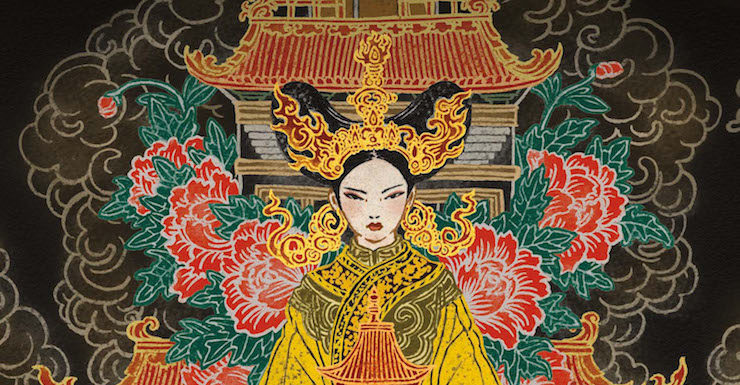The Protector is dead. For the prior three Tensorate novellas, her reign was the source of infinite conflict, concession, and intrigue. However, at the start of The Ascent to Godhood, her passing has already dealt its blow to the organization of the Protectorate. Her enemies and her loyalists both exist in uncertain times, now, striving toward a future she does not influence—but in one pub, in rebel territory, a seeker comes to speak to the head of the Machinist rebellion about the past and potential future. Lady Han is the one person left who has stories of Hekate before her ascent to the throne, and is also the one person who misses her most bitterly, despite the Protector’s death cementing her own success as an opposition force.
The Ascent to Godhood is both prequel and post-script, leaving a surprising narrative gap around the death of the Protector and the resultant regime change to focus instead on the personhood of the figures who’ve loomed over this set of novellas: Lady Han, leader of the Machinists, and Hekate, the prior Protector herself. Delivered in second person direct to a listener-“you” who is simultaneously the reader and Chuwan Sariman’s pirate wife, recipient of the documents that made up The Descent of Monsters, the novella tells the tale of a lifelong relationship between two women that soured under the aegis of power and control.
Skipping the obvious narrative focus for the fourth Tensorate novella—the regime change, Sonami’s machinations with Rider’s prophetic twin, and so forth—to instead focus on personal histories is quite a risk. And while it did take a moment to adjust to at the start of the text, the story pays dividends for a reader familiar with the rest of the series. The “call to arms” tone at the close of The Descent of Monsters drives toward the joining of a climactic conflict, sides versus sides in a fight for the future of the nation-state, but then The Ascent to Godhood settles itself firmly before/after that implied narrative climax, leaving it on the outside of the tale. It’s unexpected, intriguing.
Ultimately, I’m of two minds about The Ascent to Godhood. On a conceptual level, I’m pleased by the decision to reject the typical narrative framework Yang set up at the close of the third novella. A consistent feature of all four volumes in the series is stylistic experimentation: Each book is written in a different style, playing with alternative modes of storytelling and tone through quite varied narrators, doing unique work with the idea of story. At the same time, within that constant variation Yang has a steady hand at maintaining rich interactions between plot and character, emotion and flow.
Lady Han’s reflective narration—which is almost one widow to another, given her relationship to the Protector over the years—is handled well, as one would expect. Direct second person address is a finicky beast but Yang uses it successfully, balancing the narrative need of a receptive audience against the prose tics of an individual’s storytelling voice (which is, by necessity, performative). The implied mission directive of Chuwan’s wife, our audience stand-in, is to deliver the evidence of the experiments and Sonami’s plot to the head of the Machinists; however, Lady Han is less than receptive after Hekate’s fall, as she too is in mourning though she should be feeling victorious. The set-up works perfectly to allow us to witness the significant backstory that created Hekate as a person without forcing Yang to write a prequel. And, more intriguing: It’s filtered through the lens of the lover betrayed, who was simultaneously the victim of an extreme power differential in the relationship itself, so it’s a fractured and emotional narrative of a character who we’ve previously seen as almost-untouchable.
Focusing on the human relationship and its flaws as symptomatic of the nation and its flaws, from the perspective of an outside actor to the scene that would’ve typically been the “ending,” is good. The actual story—dancing girl turned lover and confidante and spymaster—is high drama, high passion, and high treachery, so that’s great fun. (And between women—ruthless women!) I was drawn into the doomed romantic tale and the references to other characters, other struggles, we’ve come to know in the series. It gives just enough to build our understanding of what’s happened off-screen.
Buy the Book


The Ascent to Godhood
The overall execution, though, had some unsteadiness—mostly because The Ascent to Godhood is on the leaner side, to its detriment. In its play with narrative expectation it’s doing something I appreciate a great deal and found engaging. However, in its execution of that skirting focus on the before-and-after it risks feeling unmoored, almost like an aside, due to its sparseness—rather than a matched installment of the series. I suspect that this is the result of its quick clip through the lead-in and wrap-up, set in the tavern between the two women who’ve lost their lovers. A little more flesh on those bones might’ve given some additional grounding to the emotional arc built in the told-tale and balanced the entire novella more.
As a part of the Tensorate series, though, it does stand sufficiently on its own and as a continuation of the world as a whole. Read as a tale of unfortunate romance built on exploitive power dynamics, a reflection on time and loss, The Ascent to Godhood gives us one woman’s contemplative judgement on the life she’s lived and the people she’s lived it with—or for. Read as the conclusion to the building drama of The Descent of Monsters, it tweaks audience expectations of what is needed to narratively satisfy and provides pre- and post-scripts to Hekate’s reign after it has ended, while offering us small glimpses of our familiar larger cast in passing. It’s an intriguing installment that once again offers an unexpected stylistic approach, and I do recommend it. (And, as always: It’s delightfully queer.)
The Ascent to Godhood is available from Tor.com Publishing.
Lee Mandelo is a writer, critic, and editor whose primary fields of interest are speculative fiction and queer literature, especially when the two coincide. They have two books out, Beyond Binary: Genderqueer and Sexually Fluid Speculative Fiction and We Wuz Pushed: On Joanna Russ and Radical Truth-telling, and in the past have edited for publications like Strange Horizons Magazine. Other work has been featured in magazines such as Stone Telling, Clarkesworld, Apex, and Ideomancer.










